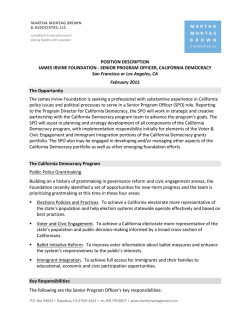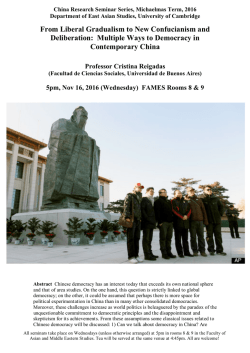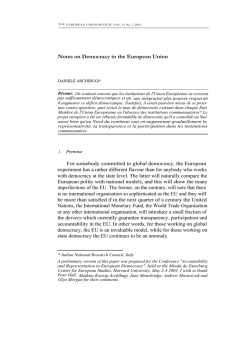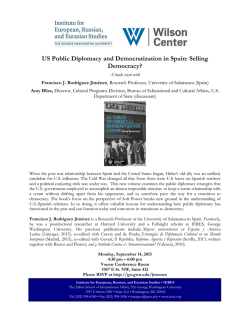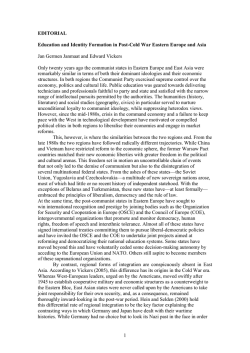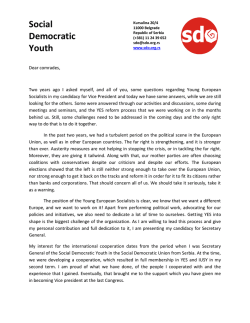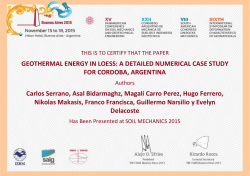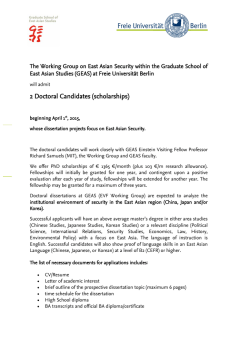
Civil Society and Democratization in Asia: Prospects and
Civil Society and Democratization in Asia: Prospects and Challenges in the New Millennium By Emma Porio 1 Abstract. Over the past two decades, civil society has captured the imagination of intellectuals, activists, donors and recipients of development assistance, and political leaders. Civil society entered mainstream political discourse and became a key factor in the democratization of socio-political life. In Asia, civil society continues to be a central force in the struggle for and consolidation of democratic space in various political regimes. Thus, this paper calls attention to the multiple models informing the articulation of civil society in various social formations. In particular, this paper focuses on the increasing and evolving role of civil society and its impacts on society and politics. It examines the conceptual foundations and interpretations of civil society within the context of state-society relationship. Without denying the origins of the notion of civil society in western rational tradition and political culture, this paper argues that the concept resonates in the values and ways of voluntary associations that are deeply rooted in Asian communities to address basic survival needs and mutual benefit concerns. Anchored on these traditions, contemporary civil society organizations (CSOs, particularly non-government organizations or NGOs) have elevated these survival and mutual-benefit concerns to the level of state politics to address more effectively the well-being of its clientele population, particularly the marginalized and disadvantaged groups in society. Furthermore, this paper argues that the growth and dynamics of civil society must be viewed within the context of state-marketsociety relationship as it unfolds in varying historical and political contexts. Finally, the paper concludes that civil society engagements in the new millennium are fraught with tensions and challenges generated by the globalization of capital and information technology, devolution of central state powers to local structures of governance, and the rise of identity/resource claims laced with fundamentalist and nationalist discourses. Introduction Political events in Asia during the last 15 years have shown that civil society is crucial in understanding the changes in economy and polity. These events have given rise to several interpretations on the concept and role of civil society in society and the democratization of political life. In turn, civil society movements (CSMs) have utilized different political and cultural schemes to advance their claims for democratic space and share of societal resources. Emerging from the various nation-states in the region, these cultural schemas are shaped by their different political-economic contexts and level of integration to global systems of capital and technology. Major social and economic transformations during the past decade have led to the decline of authoritarian governments and resurrection of democratic institutions and systems of governance in Eastern Europe, Latin America and Asia. Throughout the Asia-Pacific 1 Professor and Chair, Department of Sociology and Anthropology, Ateneo de Manila University. P.O. Box 154, Manila, Philippines. For comments, please send to:[email protected] 1 region, the respective roles of the state, market system, and civil society are being reexamined (ESCAP, 1998). In the forefront of these contestations are developmental NGOs and CBOs, who are challenging the traditional ways that the state and the market have allocated societal resources. Several political and economic developments have led to this re-evaluation, such as the deterioration and collapse of socialist regimes in Eastern Europe, the increasing integration of centralized economies like China and Vietnam to open capitalist economies, the fiscal crisis and the effects of structural adjustment. The breaking down of the Berlin Wall in 1989, symbolically ended the Cold War politics among the superpowers. This also provided a strong signal for the search for an alternative development paradigm (Porio, 1997). Assertions regarding the relationship between democracy and economic development became fashionable. And civil society became an exciting prospect for this agenda. The resurgence of democratic regimes has been mostly ushered by the emergence of vibrant civil society groups and movements. This is clearly demonstrated in the statistics provided by the Freedom House in New York. Their data show that the number of free or liberal democratic states have risen from 42 in 1972 to 56 in 1985 to 76 in 1985 -- or from 29 percent in 1972 to 33.5 percent in 1985 to 39.8 percent in 1995 (cited in Bello, 2000). Thus, the third wave of democratization as described by Huntington (1991) has been nurtured by civil society. The twin phenomenon of civil society and increasing democratization has captured the imagination of intellectuals, activists, political leaders, and development assistance agencies and generated many conferences, meetings, and publications. It has also fueled the advocacy for political and economic reforms. More importantly, it has spawned an alternative model of development assistance: the channeling of official development assistance and delivery of social services through non-government organizations (NGOs), community-based organizations (CBOs), and private foundations. Civil society groups have become alternative service delivery routes for assistance or entry points for political intervention because of the failure of existing state agencies and institutions (Brandon, 1999). Global statistics on foreign assistance attest to the centrality of NGOs in the social development. In 1975, the proportion of total aid from OECD countries delivered through NGOs was less than one percent. In 1993, this has increased to about five percent, excluding those from UN agencies and multilateral institutions (Riddell and Robinson, 2 1995; Silliman and Garner Noble, 1998). Largely, this is due to the perception that NGOs have more accountable and transparent structures and processes compared to state bureaucracies. Objectives/Structure of the Paper This paper examines the conceptual foundations of civil society and its role in shaping socio-political life in the past decade as well as their prospects and challenges for the next millennium. It argues that civil society is a key mediating force in changing the statesociety dynamics, which in turn, is also being reconfigured by the globalization of social life and the rise of identity and resource claims from various groups. Furthermore, statecivil society engagements have been influenced by the information technology, facilitating the movement of information, capital, and human resources across groups and national boundaries. Finally, the growth of civil society must always be seen within the context of the Asian states trying to balance its functions of promoting political legitimacy and economic development. The paper is divided into four parts. Part I defines the aims of the paper while part II reviews the conceptual foundations and interpretations of the term civil society. Part III explores the different roles that civil society has played in the democratization of sociopolitical life in some parts of the region. Part IV concludes that civil society is a major factor in reconfiguring the global-local nexus of state-civil society relations, which in turn, define its challenges in the new millennium. The coverage of this paper is mostly limited to Southeast Asia. The Conceptual Bases of Civil Society Civil society has a long intellectual and political history (Seligman, 1992). Several authors (e.g., Laothamatas, 1996; Gellner, 1991; He, 1997; Kumar, 1993; Rodan, 1995; Tadashi, 1996, to name a few) have extensively discussed the issues regarding the emergence and role of civil society in several historical and political contexts. To provide a conceptual frame for this paper, I will just briefly cite a few key interpretations of civil society. Concept of civil society. Caroll (2000) defines civil society as "people coming together around a common concern, a concern which is linked to the values of the wider society, 3 and insisting that the major institutions--the state, political parties, and business take these values into consideration. Diamond (1994, 5) gives a more extensive definition: " Civil society is … the realm of organized social life that is voluntary, selfgenerating, (largely) self-supporting, autonomous from the state, and bound by a legal order or set of shared rules. It is distinct from "society" in general in that it involves citizens acting collectively in a public sphere to express their interests, passions, and ideas, exchange information, achieve mutual goals, make demands on the state, and hold state officials accountable. Civil society is an intermediary entity, standing between the private sphere and the state." According to Diamond (1994), civil society is alive and well when citizens participate in church groups, professional associations, women's groups, trade unions, human rights groups, and civic associations in order to press for state and economic reforms. It encompasses a vast array of formal and informal organizations engaged in a wide range of activities to achieve economic, cultural, educational and developmental goals. Pluralism and diversity characterize the groups comprising civil society. It is not synonymous with society and beyond being "voluntary, self-generating, autonomous, and rule-abiding", the organizations of civil society are distinct from other social groups in several respects. It is concerned with public rather than private ends and relates to the state not to gain formal power but rather "to seek from the state concessions, benefits, policy changes, relief, redress, or accountability" (Diamond, 1994, 7). It is the politically active sector of society. Autonomous both from the state and from political parties, it encompasses masses of citizens engaged in public protest, social movements, and NGOs acting in the public sphere. Civil society excludes the household, profit-making enterprises, political parties, and groups striving to gain control of the state through armed rebellion (Silliman and Garner Noble, 1998, 13). Civil society is the realm of collective, public action between the private sphere and the state, which Serrano (1993) calls the "politically active popular sector" of society. Meanwhile, Kumar (1993,383) understands civil society as the space between the family and the state, or between the individual and the state; in the non-state institutions which organize and educate citizens for political participation". Antonio Gramsci (1977) 4 understands civil society as one of the key elements comprising his three-part framework of the state, economy, and civil society. It is the primary locus for creating ideology, a key element in building consensus and legitimizing power. Hegemony, then, whether cultural or social of a dominant group is built on consent rather than coercion. Habermas (1989) conceptualizes it as the " the realm which constitutes the intersection between state and society". Huang (1993), deriving inspiration from Habermas, conceptualizes it as the third sphere. He is also skeptical of the development of societal organizations in societies long dominated by party-state politics. Civil society, in general, is the political space between the state and society. In particular, it is the space occupied and created by the non-profit sector between the state and the market. Often, the non-profit sector is dominated by NGOs in alliance with grassroots or CBOs. Social movements constitute an important subset of civil society. Rocamora et al (1998) also added that the growth of civil societies has to be understood at four interrelated levels: state, political society, civil society and international actors. They also argue that democratic movements have to be always calibrated within the post- Cold War politics. For a better appreciation of the relationship among these entities, see schematic diagram below. SOCIAL FORMATIONS STATE CIVIL SOCIETY MARKET (Non-profit) (Profit) Figure 1. Schematic representation of the relationship of state, civil society, and the market. According to Rodan (1995,21), civil society is just one form of political space where opposition parties can articulate and negotiate their interests. Currently, the space of civil 5 society enjoys wide support both in the North and South and from elites to marginalized groups. Indeed, the seduction of the civil society discourse is quite intoxicating! But there is a need to demystify and be more realistic about the power and potential of civil society in democratizing state and political power. Because of their visibility and popularity, NGOs are almost taken as the equivalent of civil society. But civil society is best conceptualized as a political space created by NGOs, CBOs, professional groups, and other voluntary associations allied with broad-based movements (e.g., women's, indigenous people's, environment). The composition of civil society is quite dependent on the political and economic context of the society and nationstate. In the same manner, so are the relationship, strategies, and skills of CSOs and networks in their engagements with the state. The Empowered Civil Society. The previous section described the characteristics and organizational bases of civil society. But when does civil society become mobilized and visible to take on larger political issues? Or what are the conditions that push CSOs to take issues into a broader public arena and organize street protests, demonstrations, and other mobilization activities challenging state action/inaction? The following section will attempt to describe the conditions, the evolving strategies and impacts on the state, society and within civil society groups, and their capacity to create and consolidate the democratic process. Several conditions transform CSOs into broad movements to challenge the state on its decisions and actions. Civil society groups go beyond their organizational concerns to work towards broader networks and coalitions when the following conditions are present. There is freedom to organize and exchange information; there is a shared perception that the traditional institutions of society like the state cannot no longer be relied upon to protect the rights of the majority. As a result, there is widespread indignation among CSOs regarding the violation of basic rights of the citizens and they enjoy broad support from media, and church both from within and outside. Historical evidence in the region has shown that vibrancy of civil society is generated by economic growth and the expansion of the middle class, as in the case of East Asian economies and some countries in Southeast Asia like Thailand. Civil society has also 6 been critical in restoring democracy in formerly authoritarian regimes like the Philippines (Marcos-Aquino-Ramos regimes) or Indonesia (Soeharto-Habibie-Wahid regimes). The attraction of civil society movements lies in its promise of social inclusion among marginalized groups to political and economic systems traditionally dominated by few elites (Silliman and Garner Noble, 1998, 10). More significantly, the tactics and strategies of civil society anchored on peaceful (i.e., reformist) mechanisms appeal to a broad spectrum of society. In this manner, then, CSOs/CSMs provide greater attraction and support compared to progressive groups aligned with the Left. Civil society: Asian or western? Several writers (e.g., Muzaffar, 1996; Serrano, 1994) have argued that civil society is rooted in western rational tradition and political culture anchored on the notion of state and citizenship. Serrano, however, also argued that the values and practices associated with communal institutions in Asia find resonance in civil society: "Voluntary action is deeply rooted in Asian communities. It is directed toward common concerns that cannot be adequately addressed by individual families and extended kinship support systems: production, exchange, rituals from birth to death, and collective security, all of which maintain community consensus and cohesion. The most common form of organization is the selfhelp and mutual-exchange group. In Indonesia, the gotong royong or mutual help is equivalent to bayanihan in the Philippines. Funeral associations, of which there are thousands in Thailand, are also mutual-benefit associations in Thailand "(Serrano,1994, 272). The tradition of voluntary associations in Asia has been rooted in the need to fulfill basic social security needs that are beyond the capacity of individual, family and clan capacities. Thus, the priority of civil society organizations is to secure the autonomy of people's organizations so that their basic needs can be addressed. But this situation also reflects the relative inability of the central or local state to respond to the needs of its citizenry. Contemporary CSMs have their bases on voluntary associations, groups, and networks at the community level. But they have succeeded in connecting their local struggles for social security to the need for reforms in the larger political and economic structures. They have realized that broader structural changes are necessary in addressing the welfare needs of the people, especially the marginalized and disadvantaged groups. The 7 traditional and cultural bases of contemporary civil society have been largely transformed by the growing realization among civil society groups that the structural distribution of societal resources and the well-being of individuals and communities are largely mediated by broader state policies and programs. This can be seen in their evolving strategies which seem to indicate the increasing political sophistication of CSOs. The argument that civil society is an alien concept in Asia is quite interesting because Serrano's earlier characterization of voluntary associations strongly resembles the associational life described by Tocqueville in America a hundred years ago. Serrano's point, however, heightens an important principle: in understanding state-civil society dynamics, one must always recognize the different social, political, economic, and cultural contexts. Another issue popularly articulated before the Asian crisis was that Asian values are not quite compatible with the western-based notions of liberal democracy. Alagappa (1995) noted that elites in a number of countries in the region — China, Vietnam, Burma, Indonesia, Singapore, Malaysia, Brunei, and Laos — support economic development but reject democracy. Several Asian leaders, notably Singapore's Lee Kuan Yew, have argued that many of the institutions and practices associated with western democratic states cannot be applied to Asia at this point in time (Muzzafar, 1996). Thus, acceptance or at most tolerance for voluntary associations and institutions that attempt to effect policies and programs of the state is not high. Some political leaders (notably Lee Kuan Yew) have attempted to justify authoritarian regimes by asserting that democratic institutions, like civil society, are not compatible with Asian cultures and values. But Korea's Kim Dae Jung, citing the ideas of a Chinese philosopher, has rejected this idea and argued that democracy has a place in Asian tradition. Moreover, Serrano and Muzaffar stress that many of these democratic values have been articulated by various religions and cultures found in Asia. But Alagappa noted that this retreat for cover under Asian values is really a resistance to the "reactionary imperialism" of the West upon Asia. Prior to the Asian crisis, Fukuyama (1995) deriving inspiration from the experiences of Singpaore and Malaysia among others, asserted that the only competitor to liberal democracy is Asian paternalistic authoritarianism. However, the downfall of Suharto in 8 Indonesia in the hands of civil society may have eroded the strength of this argument Meanwhile, Gellner (1991, 507) underscores the difficulty of generating a civil society capable of supporting a liberal democracy in communist and Muslim societies. Indonesians, however, in the wake of protests during the Asian crisis argue that in traditional Muslim societies, there is no clear separation between the state and civil society. Indonesian NGO leaders maintain that the civil society, masyarakat madani, is part of the Indonesian Muslim tradition. But declining political legitimacy has forced some regimes in the region to accommodate the increasing tide of CSMs. The state's accommodation to civil society is strongly linked to the need for political legitimacy. Moreover, the states' commitment to economic growth and modernization has pushed them to give their reluctant support to ideas and practices associated with civil society. In China, for instance, the development of professional associations and other civil society groups especially in urban areas, is seen as part of a modernizing society. In the same manner, NGO efforts at strengthening the rule of law is seen as part of restructuring institutions in support of China's increasing integration to the capitalist system. In Burma, meanwhile, the State Law and Order Council (SLORC) is an attempt by the military junta to gain political legitimacy. Thus, the opposition under Aung San Kyi is tolerated to a certain extent while the state attempts to liberalize the economy and find a more formal political role for the military. In Indonesia, citizens endured the state's intolerance for civil society groups because of its promise of political stability and economic development. In the late 1990s, however, professional associations, intellectuals, human rights associations, Islamic organizations, Christian minorities and segments of the armed forces, began challenging top-level corruption and excesses of power. These civil society groups have become a major voice for economic and political reforms. The expansion and growth of Asian economies have created discernible changes in the lifestyle of its population. In China, for example, higher disposable income and greater access to outside information have allowed an expanding middle class more educational, training, and travel opportunities. In the same manner, the number of voluntary associations with professional, charitable, relief and educational goals has increased. 9 Although subject to government regulation, these associations area allowed to define their own agendas. Progress in economic and political reforms has expanded the space for civil society groups in socio-political life. Thus, economic development facilitates democratization. In Korea, the NGOs were crucial in the political mobilization in the late 1980s (Silliman and Garner Noble, 1998,9). In 1986, Vietnam adopted doi moi or political and economic renovation; critics, however, have noted that economic benefits are not equally shared. Challenges such as these have pushed Vietnam to explore alternative models of governance. Civil Society, Democracy, and the State The aim of civil society is not to transform the state but to democratize society (Atienza, 1994). In contemporary politics, the most visible, articulate, and influential among the CSOs are the NGOs. They are the agents for consolidating and maintaining democracy rather than initiating it. The associational life of civil society serves as a training ground for democracy as participation in it sharpens political skills and increases the efficacy of citizens. Voluntary associations develop democratic attitudes and values as well as form and preserve civic culture that support democracy. Participation in associational life increases tolerance and willingness to compromise and appreciation for the rights and obligations of a democratic citizen (Diamond, 1994 cited by Silliman and Garner Noble, 1998). This can be seen in the political and advocacy activities of NGOs to facilitate political participation and redress the inequalities of society. Furthermore, NGO networks, coalitions, and groups constituting civil society institutionalize the values and ethos of civil culture necessary for a stable democracy (Dawisha and Parrot, 1994,125). Deriving inspiration from Huntington (1984), Diamond further argues that the functions of civil society include providing a countercheck to potential excesses of a democratic state and to democratize authoritarian states. Silliman and Garner Noble (1998,18-19) credit civil society with the following achievements: (1) creates a vibrant public discourse; (2) redefines the content of politics, and (3) increases institutionalization of democratic processes. Although the authors are describing civil society in the Philippines, I would argue that these achievements are applicable, albeit in varying degrees, to civil society in other countries in the region. 10 Civil society has redefined and broadened the content of politics. To a large extent, it has been responsible for the inclusion of issues previously viewed as not amenable to political action like domestic violence, rights of indigenous peoples to ancestral lands, community rights to natural resources. It also exerted pressure for the institution of democratic processes like free elections and the promotion of human rights. In the era of worldwide pressure for democratization, state leaders have allowed political space for civil society. A classic example is documented by the excellent study of Baogang He (1997) on the democratic implications of civil society in China. Describing the existence of semi-civil society or quasi-civil society in China, he asserts that these groups serve dual functions, namely: 1) as channel for state control, and 2) as new tool or source of legitimation. His dual-function thesis provides us with an excellent guide in understanding the place of civil society in countries like China, Vietnam and Cambodia. The presence of NGO leaders in the Wahid political administration has strengthened the emerging civilian character of the Indonesian state. In the process, it aids the state in constructing political legitimacy. In Vietnam, there is a different pattern of state-civil society relationship in the South as compared to the North; the South seems to provide a more supportive context in the development of CSOs. The presence of NGOs and their increasing role in the delivery of social services have been, to a certain extent, calibrated to increase the legitimacy of the central state based in Hanoi. The socio-political activities of CSOs during the past two decades have contributed to their growing capacity to engage the state. Over time, CSOs and networks have grown in terms of skills, specialization, and their capacities to assist marginalized groups. Niyom (1997), in observing the growth of NGOs focused on urban poor alleviation in Bangkok, noted their growing specialization and interdependence. This allowed them a greater sphere of influence over their partner-CBOs, as well as lesser dependence on state-funded programs. But while the NGO community shares the core values of autonomy, pluralism, diversity, closeness to the grassroots, a bottom-up perspective, and volunteerism, there is a healthy disagreement over strategy and the precise role of citizen organizations. This is especially true in societies like the Philippines with a vibrant civil society. 11 Some authors like Karaos (1994) and Atienza (1994) have argued that power in civil society has a moral force. Other authors (e.g., Bullard, 2000) have asserted that this space is not benign or neutral because it is the arena where conflicting class interests are contested. Short of direct domination and coercion, the state and the market must gain the consent of civil society for their legitimacy. For whoever captures civil society captures all! Some authors (e.g., Diamond, 1994; Coronel Ferrer, 1997) are unabashedly euphoric about the rise of civil society in the restoration of democratic processes and institutions. Others like Rodan (1995), however, take a more balanced view. Reminiscent of the Gramscian tradition, these authors assert that civil society always has to be viewed within the struggle for power between state and societal institutions and stakeholders. Contemporary analysts of civil society have derived their inspiration primarily from the political theories of Locke and Tocqueville or from Hegel, Marx, and Gramsci. Those who are inspired by the first two theorists, (e.g., Diamond, 1994, 1998) celebrate the democratic role of CSOs/CSMs and credit these groups for consolidating/stabilizing the democratic processes and institutions. Their ideas are strongly articulated in the developmental policies and programs promoted by UN agencies, bilateral, and multilateral institutions in third world and non-Western countries. But those who are inspired by the latter group of critical theorists are not as impressed with the momentary gains of CSOs/CSMs. Civil Society, Democratization, and the Middle Class The emergence of civil society has been strongly associated with the expansion of the middle-class in Latin America (O' Donnell, Schmitter and Whitehead, 1988) and other parts of the globe (e.g., Laothamatas, 1998). As earlier argued, the prominence of civil society discourse in contemporary politics is a function of modernization and economic growth, the expansion of the middle class, and the state's accommodation of the new forces as way of strengthening its legitimacy. The emergence of new classes redefines the issues and the character of the opposition. A new economic system, meanwhile, gives rise to new sources of wealth, and class interest gives rise to new fractures in new sociopolitical issues. Compared to the 1970s, when state opposition came mostly from peasants, workers, and student movements, civil society has transformed political opposition in the 12 1980s and 1990s to include segments of the upper, middle, and working classes (Rodan, 1996). The rise of the middle class has been a crucial factor in broad-based mobilizations that often centered on demands on the state to institute economic and political reforms. Surin Maisrikrod (1998), in examining political movements in Thailand, argues that the middle class was crucial in installing democratic regimes rather than in consolidating it. He further argues that democratic stability is always a compromise between the state and the capitalist class, on one hand, and the inclusion of the middle class in the political process, on the other. This is understandable considering the constitution of civil society in Thailand — a loose coalition of intellectuals, professionals, NGOs, CBOs, workers and peasant organizations. In Taiwan, as well as in other parts of Asia, the middle, business, and the working classes have been credited for the increasing democratization of state politics. Exploring the relationship between industrialization and the growth of middle classes in East and Southeast Asia, Rodan (1996, xi) argues that efforts "to establish greater space for political parties, and civil societies that feed into these organizations are only part of the attempts to extend avenues for contesting state power". He questions the assertion of some writers that the expansion of civil society is closely linked with the advance of liberal democracy. The rise of civil society, then, is a particular form of accommodation by the state to contending social forces. Thus, it is an effort by political regimes to reconstitute and consolidate state power for greater legitimacy before its constituency and the international political order. State-Civil Society Relations: Engagements and Evolving Strategies The skills and strategies utilized by CSOs in relating to the state are in part dependent on the stage of social mobilization and political transitions. In the Philippines, Wui and Lopez (1997,1) observed the marked shift among civil society groups -- from that of opposition and confrontation during the Marcos regime to that of negotiating and creating alternatives during the Aquino and Ramos administrations. Likewise, in Indonesia, during the struggle against the authoritarian regime of Suharto, there was a relative unity among CSOs and networks vis-à-vis the state. In these political shifts (from Suharto to Habibie and then to the Wahid administration), civil society groups were divided in their strategies 13 of confrontation and negotiation. Thus, in different stages of the democratic transition, CSOs assume different roles and utilize different strategies in their relationship to the state. The rise of civil society in Asia and its political impact is relative to the location in the configuration of political and economic power within a particular nation-state. This was clearly illustrated in the fight against the Marcos dictatorship and the ascendance of civil society in the Philippines' 1986 EDSA People Power Revolution. The Left, a key force in the political opposition against the Marcos regime, lost its traditional sphere of influence because it refused to participate in the 1987 snap elections called by Marcos and in the call for people support by the Church during the critical days of the EDSA Revolution. The same pattern can be seen in the subsequent role of civil society and other opposition groups in the Aquino and Ramos administrations. The contentious strategies for engaging the state has often caused fragmentation among CSOs and networks. For example, debates over the role of NGOs in political elections have occupied the energies of CSOs, often distracting them from more fundamental needs of their clientele groups. In the same manner, their lack of consensus regarding the leadership and tactics have created political cleavages within the CSOs (Serrano, 1994). The character of civil society's engagement with the state and the market has to be viewed historically according to the phase of the democratic movement. Nothing illustrates this better than the recruitment of NGO leaders to government positions. When NGOs are recruited to the business of policy-making and program implementation, their strategies that worked so well during the phase of critical engagement with the state are rendered ineffective during this phase of strategic collaboration. The particular relationship of civil society groups and their leaders was clearly seen during the Aquino administration in the Philippines and currently in the Wahid administration in Indonesia. The overwhelming unity of civil society groups is quite impressive against a common enemy like an oppressive state (e.g., against the Marcos dictatorship or the authoritarian regime of Suharto). But once this common enemy is dislodged, the fragility of their alliances is unmasked. 14 Understanding the dynamics of civil society involves two essential elements: (1) the plurality of groups that make up civil society and recognizing their class dimensions, and (2) fractions of the dominant groups and their tendency to appropriate certain groups in civil society to gain legitimacy and suppress those who will challenge them. Recognizing these elements allow us to see more clearly the limits and potentials of CSOs' pluralism and heterogeneity. While diversity is a great strength among CSOs and networks, it is also their main weakness. Often, this creates the divisions within civil society, which make them susceptible to the political maneuvers of the dominant groups. This becomes more meaningful in the context of neo-liberal globalization that produces both gainers and losers depending on the structural location of stakeholders. It is during these crucial times that class interests, which tend to be masked by civil society, come to the surface and increase the potential for divisiveness. The Asian crisis has set the stage for the intensification of the above conditions and the political fragmentation among CSOs. The previous years of sustained economic growth have led to the growth of the middle class and the democratization process, and facilitated the forging of collaborative partnerships and linkages between CSOs and the state in implementing developmental programs. The crisis, however, brought back the confrontational strategies of CSOs in the earlier period. Capital flight, closing of factories, and retrenchment of workers brought protests and strikes back into the forefront of statecivil society relations. This calls attention to the danger of being mesmerized by the contingent successes of CSOs and CSMs. Globalization, State, and Civil Society. State-civil society relations are being redefined by the globalization of economy, social movements and the information technology. Both at national and local levels, the impacts of these broad forces are also being reconfigured by socio-political movements advocating for greater political space as well as a larger share of societal resources. More than ever, the non-profit sector or civil society, is faced with a formidable task to mediate between the state and the market whose political and economic agenda often run counter to the values of equity and justice. The social effects of globalization have intensified civil society engagement with the state. The growing economic integration and interdependence among nation-states threaten 15 political and cultural sovereignty. In addition, information technology allows data and capital to move around the globe at the speed of light. Initial research findings show that the newfound freedom and efficiency from these technological changes seem to exacerbate existing structural inequalities. Another factor that has shaped civil society engagements is the globalization of social movements (e.g., environment, and children, women's and indigenous people's rights). Partly, these have been brought about by the development agenda of UN agencies and other multilateral institutions like the World Bank which have spawned the development of global social movements (GSMs). These bodies have accorded NGOs political recognition and have broadly supported their activities. Aided by the techno-economic revolution and by these multilateral institutions, GSMs have transnationalized civil society engagements. While this new trend provides support and strength to local and national mobilizations, it has also generated conflicts and tensions from within and without. Civil society groups also create a new kind of elitism and exclusion among them vis-a-vis the state. For example, the efforts towards economic integration in the region through the WTO and AFTA provisions have spawned a lot of criticisms from civil society as witnessed in the Seattle (fall 1999) and the Bangkok (Feb. 2000) meetings. These political mobilizations have further complicated the deleterious effects of the Asian crisis. Given these prevailing conditions, the demand for state reforms, participation of civil society, and good governance have become part of the political idioms that inform much of the identity and resource claims in the postmodern age. Civil Society in the New Millinneum: Tensions and Challenges Caroll (2000) enumerates the challenges and tensions of civil society which emanate from its diversity and pluralism, and from its engagement with the state and the market. These tensions revolve around the following issues: 1) the building of consensus on values among civil society groups with its pluralism and internal heterogeneity (i.e., therefore no monopoly of "correct" values); 2) the interfacing or critical engagment with the global economy, the political society, the state; and 3) creating social institutions aimed at enlarging the space for public articulation and debate of issues and values. 16 According to Racelis (2000), the major challenges of civil society are poverty and inequity, good governance, globalization, and strengthening NGO/social development practitioner roles and capabilities. In responding to the above challenges, CSOs have to reconcile with forces that can aid or complicate their strategies for political and economic reforms such as the social/political security issues, decentralization of state powers, and the digital revolution in information technology. At the heart of the challenge is how to reconcile the values associated with civil society (e.g., justice, compassion, economic freedom) with the values that inform the market and state bureaucracy (rationality, efficiency, profit). Economic and technological forces behind globalization seem to further widen the political and economic gap between those who are positiviely integrated to the global system and those who are not. Civil society engagements with the state in the new millinneum are therefore fraught with tensions and challenges generated by the globalization of capital and information technology, devolution of state powers to local systems of governance, and the rise of identity/resource claims laced with fundamentalist and nationalist discourses. Bibliography Alagappa, Muthiah. (1995), "The Asian Spectrum." Journal of Democracy. Vol. 6 No. 1: pp. 29-43. Baogang He. (1997), Democratic Implications of Civil Society in China. Great Britain: Macmillan Press Ltd. Bello, Walden. (2000), "Washington and the Demise of the 'Third Wave' of Democratization," Focus on the Philippines. Issue #5 Series 2000. Carroll, John J. (2000), "Civil Society: What is it?" Presented at the 15th Anniversary Lecture Series of the Institute on Church and Social Issues, Loyola Heights, Quezon City. Chandhoke, Neera. (1995), State and Civil Society: Explorations in Political Theory. New Delhi: Sage Publications. p. 9. Diamond, Larry. (1994), "Rethinking Civil Society: Toward Democratic Consolidation." Journal of Democracy. Vol. 5 No. 3: pp. 4-17. ESCAP. (1998), "Regional Prospects for Social Development: An Overview." Part One of Asia and the Pacific into the 21st Century: Prospects for Social Development, Theme Study of the 54th Session of ESCAP, 20-28 April 1998. Fukuyama, Francis. (1995), "The Primacy of Culture." Journal of Democracy. Vol. 6 No. 1: pp. 7-14. Gellner, Ernest. (1991), "Civil Society in Historical Context." International Social Science Journal. Vol. 43 No. 3: pp. 495-510. 17 Ghils, Paul. (1992), "International Civil Society: International Non-Governmental Organizations in the International System." International Social Science Journal. Vol. 44 No. 3: pp. 417-31. Gold, Thomas B. (1990), "The Resurgence of Civil Society in China." Journal of Democracy. Vol. 1 No. 1: pp. 18-31. Hann, Chris and Elizabeth Dunn. (1996 ), "Introduction," in Hann, Chris and Elizabeth Dunn (eds.), Civil Society: Challenging Western Models. Great Britain: Routledge. pp. 126 Heberer, Thomas, (1997), "Asian Values and Democratization," in Leopoldo J. Dejillas and Gunther L. Karcher (eds.), The Development of Democracy in the ASEAN Region. Makati City, Philippines: The Institute for Development Research and Studies (IDRS) and Konrad Adenauer Foundation (KAF). pp. 104-11. Held, David (ed.). (1993). Prospects for Democracy: North, South, East, West. Cambridge, United Kingdom: Polity Press. Hofmeister, Wilhelm. (1997), "The Promotion of Democracy as a Task of International Cooperation," in Leopoldo J. Dejillas and Gunther L. Karcher (eds.), The Development of Democracy in the ASEAN Region. Makati City, Philippines: The Institute for Development Research and Studies (IDRS) and Konrad Adenauer Foundation (KAF). pp. 3-19. Ibrahim, Anwar. (5 Jun 1998), "A Wave of Creative Destruction Is Sweeping Asia." International Herald Tribune. Jaffar, Kamarudin. (1997), "The Role of Values, Customs and Traditions in the Development of Democracy in the ASEAN Region," in Leopoldo J. Dejillas and Gunther L. Karcher (eds.), The Development of Democracy in the ASEAN Region. Makati City, Philippines: The Institute for Development Research and Studies (IDRS) and Konrad Adenauer Foundation (KAF). pp. 80-8. Laothamatas, Anek (ed.). (1997), Democratization in Southeast and East Asia. New York: St. Martin's Press, Inc. Muzaffar, Chandra. (1996), "Democracy, the West and Asia," in Brid Brennan, Erik Hiejmans and Pietje Vervest (eds.), ASEM Trading New Sillk Routes. Beyond GeoPolitics and Geo-Economics: Towards a New Relationship between Asia and Europe. Amsterdam: Transnational Institute (TNI) and Focus on the Global South. pp. 93-5. O'Brien, Robert et al. (1998), "Global Economic Institutions and Global Social Movements Projects." Presented at the International Studies Association Meeting, Toronto, March 1997. O'Donell, Guillermo, eds. (1988), Transitions from Authoritarian Rule: Comparative Perspectives. Baltimore and London: The John Hopkins University Press. Porio, Emma. (1997), Urban Governance and Poverty Alleviation in Southeast Asia: Trends and Prospects. Philippines: Global Urban Research Initiative (GUIR) in Southeast Asia; the Department of Sociology and Anthropology, Ateneo de Manila University, and the Center for Social Policy and Public Affairs, Ateneo de Manila University. Przeworski, Adam. (1991), Democracy and the Market: Political and Economic Reforms in Eastern Europe and Latin America. Cambridge, United Kingdom: Cambridge University Press. Racelis, Mary. (2000), "The Challenges that Philippine Civil Society Faces in Today's Milieu." Presented at the 15th Anniversary Lecture Series of the Institute on Church and Social Issues, Loyola Heights, Quezon City. Rocamora, Joel. (1998), "Liberation, Democratization and Transitions to Statehood In the Third World," in May Jayyusi (ed.), Liberation, Democratization and Transitions to Statehood In the Third World. Ramallah, Palestine: Nadia. pp. 17-24. 18 Rodan, Garry (ed.). (1996), Political Oppositions in Industrializing Asia. London: Routledge. Seligman, Adam B. (1992), The Idea of Civil Society. New York: Free Press. Serrano, Isagani R. (1994), "Civil Society in the Asia-Pacific Region," in Citizens Strengthening Civil Society. World Assembly Edition. USA: McNaughton and Gunn, Inc. pp. 271-317. Shattuck, John. (1997), Statement on U.S. Democracy Promotion in Asia by the Assistant Secretary of State for Democracy, Human Rights, and Labor presented before the House International Relations Committee, Washington, DC, September 17, 1997. Siliman, G. Sidney and Lela Garner Noble. (1998), "Introduction," in Siliman, G. Sidney and Lela Garner Noble (eds.), Organizing for Democracy: NGOs, Civil Society, and the Philippine State. Quezon City: Ateneo de Manila University Press, pp.18-19. Tadashi Yamamoto. (1996), "Emerging Civil Society in the Asia Pacific Community: Nongovernmental Underpinnings of the Emerging Asia Pacific Community." Contribution to Asia Pacific Community Building. Tokyo: Institute of Southeast Asian Studies and Japan Center for International Exchange, 1995. A revised edition was published in 1996. Wui, Marlon A. and Lopez, Glenda S. (eds.). (1997), State-Civil Society Relations in Policy-Making. Third World Studies Center. 19
© Copyright 2026
